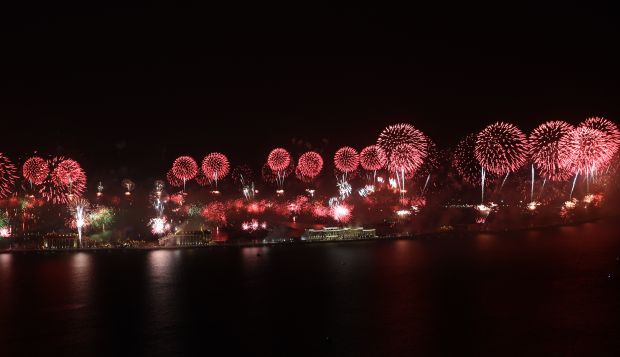On Tuesday evening, Dubai grabbed international headlines with its beautiful firework display to celebrate the New Year and the city’s extraordinary success story. The emirate of Dubai has become a success, and the United Arab Emirates should be proud of it. Anyone interested in Arab development should examine the growth of this city—an example many Arab countries could benefit from.
While it lacked infrastructure and had only modest capabilities in the very recent past, the young nation, which celebrated only its forty-second National Day in December, has reached a milestone not just in terms of commerce, but also in the context of international communication. This is exemplified by Dubai winning its bid to host Expo 2020, one of the world’s most important international fairs.
The fireworks display at the Burj Khalifa, the world’s tallest building, was dazzling. However, what is more important than the stunning nature of the display is the thought of how Dubai and the UAE were able to achieve this degree of success in such a short period of time. This success is especially remarkable if you remember that the UAE is located in a part of the world that has been known for its instability over the past 60 years.
It would be easy to attribute Dubai’s success to the UAE’s wealth. However, such a claim is simplistic, and based either on ignorance and a lack of research or part of a direct attempt to play down the importance of an Arab success story amid the complete failure of some Arab nations that had previously been wealthier than the UAE. One major difference is that these countries have wasted their efforts and their peoples’ capabilities in unnecessary internal and external wars. These countries have also frittered away their potential in the periods between those wars.
Is it so strange that Dubai has grabbed the world’s attention with its New Year’s celebrations, while several Arab countries have been suffering from the horrors of war over the past three years?
Not at all. Success should be celebrated, even though the world has a duty to rush to the side of the victims of wars everywhere. However, the question remains: how long will Arab societies continue to be beset by conflict and war? During the second half of the 20th century, it became clear that some of these wars were motivated by nationalist agendas. So how can one explain the wars inspired by regional and sectarian hatred that continue to grip the Arab world? Is there any hope that 2014 will see less bloodshed than 2013?
Despite the importance of being positive and optimistic, it saddens me to answer in the negative. No, I do not think there are any signs that the Arab Spring states will have a better year. In fact, 2014 will probably be another bloody year for the region, and the years to come will bring more destruction and displacement, with no certain end in sight.
Three years ago, the Arab world entered a vortex that opened first in Tunisia. When despair took hold of him on December 17, 2010, Tunisian street vendor Mohamed Bouazizi—who was simply trying to provide for his family—set himself on fire. He passed away on January 4, 2011, and so today is the third anniversary of his death. Some were also waiting for the right moment to set fire to the region’s political regimes, which quickly collapsed in a manner that astonished even those who were demanding their fall.
I do not subscribe to the view that what happened in Tunisia, Egypt, Yemen and Libya, and finally in Syria, was part of a conspiracy planned and executed by unknown parties. However, I do not to rule out the presence of people who were waiting for the right moment to bring these regimes down, possibly including a combination of forces, including both local parties with a patriotic agenda and aspirations for change as well as strong foreign forces. These forces may have shared similar interests in a particular time and place, but this can and will change, as these same forces find they have opposing interests and views in other circumstances. The length of the struggle will depend on the degree to which these forces agree, and it is ordinary people who are paying the price.
Tragedies and horrors should not stop the flow of daily life, even when war is at its worst. Despite the growing pessimism, there is something optimistic about the scenes of joy at Dubai’s wonderful New Year’s Eve celebration. I truly hope that one day, the Arab cities and villages that are suffering the brunt of bloody wars will experience a similar joy.
